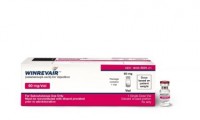-
Novo Nordisk Acquires Cardior Pharmaceuticals for $1.112B in Effort to Bolster Cardiovascular Disease Pipeline
- Source: drugdu
- 342
- March 29, 2024
-
Blood Analysis Predicts Sepsis and Organ Failure in Children
- Source: drugdu
- 302
- March 29, 2024
-
Simple Skin Biopsy Test Detects Parkinson’s and Related Neurodegenerative Diseases
- Source: drugdu
- 395
- March 29, 2024
-
Mabwell reaches the Oversea Market of South Asia and Africa
- Source: drugdu
- 547
- March 29, 2024
-
a global network for coronaviruses
- Source: drugdu
- 228
- March 29, 2024
-
Ruike Biologicals and Rongsheng Biologicals Sign Strategic Cooperation Agreement on New Adjuvant Vaccine Project
- Source: drugdu
- 332
- March 29, 2024
-
Beijing Municipal Party Secretary Yin Li Met with Novartis Global CEO Wansheim
- Source: drugdu
- 338
- March 29, 2024
-
LifeArc provides £750,000 fund for clinical trial to treat neuroferritinopathy
- Source: drugdu
- 406
- March 29, 2024
-
PhaSER Biomedical and the Sanders TDI partner for clinical drug discovery research
- Source: drugdu
- 580
- March 29, 2024
-
Merck Drug for Heart and Lung Disorder Wins a First-in-Class FDA Approval
- Source: drugdu
- 504
- March 28, 2024
your submission has already been received.
OK
Subscribe
Please enter a valid Email address!
Submit
The most relevant industry news & insight will be sent to you every two weeks.

















